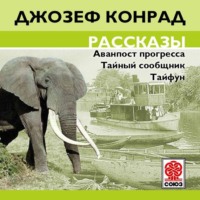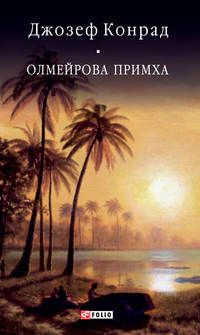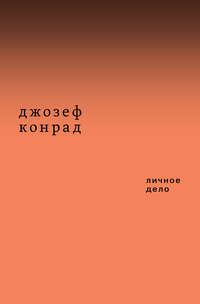 полная версия
полная версияRomance
They must kill the cattle, these caballeros. He scolded ironically. Of course. They must feed on meat like lions; but their souls were like the souls of hens born on dunghills. And behold! there was he, Manuel, not afraid of shadows.
He was coming in, there could be no doubt. Out there in the full light, he could not possibly have detected that rapid appearance of my head darted forward and withdrawn at once; but I had a view of his arm putting aside the swinging flask, of his leg raised to step over the high sill. I saw him, and I ran noiselessly away from the opening.
I had the time to charge Seraphina not to move, on our lives – on the wretched remnant of our lives – when his black shape stood in the frame of the opening, edged with a thread of light following the contour of his hat, of his shoulders, of his whole body down to his feet – whence a long shadow fell upon the pool of twilight on the floor.
What had made him come down? Vanity? The exacting demands of his leadership? Fear of O’Brien? The Juez would expect to hear something definite, and his band pretended not to believe in the stratagem of the bottle. I think that, for his part, from his knowledge of human nature, he never doubted its efficacy. He could not guess how very little, only, he was wrong. How very little! And yet he seemed rooted in incertitude on the threshold. His head turned from side to side. I could not make out his face as he stood, but the slightest of his movements did not escape me. He stepped aside, letting in all the fullness of the light.
Would he have the courage to explore at least the immediate neighbourhood of the opening? Who could tell his complex motives? Who could tell his purpose or his fears? He had killed a man in there once. But, then, he had not been alone. If he were only showing off before his unruly band, he need not stir a step further. He did not advance. He leaned his shoulders against the rock just clear of the opening. One half of him was lighted plainly; his long profile, part of his raven locks, one listless hand, his crossed legs, the buckle of one shoe.
“Nobody,” he pronounced slowly, in a dead whisper.
While I looked at him, the profound politico, the artist, the everlastingly questioned Capataz, the man of talent and ability, he thought himself alone, and allowed his head to drop on his breast, as if saddened by the vanity of human ambition. Then, lifting it with a jerk, he listened with one ear turned to the passage; afterwards he peered into the cavern. Two long strides, over the cold heap of ashes, brought him to the stone seat.
It was very plain to me from his starting movements and attitudes, that he shared his uneasy attention between the inside and the outside of the cave. He sat down, but seemed ready to jump up; and I saw him turn his eyes upwards to the dark vault, as if on the alert for a noise from above. I am inclined to think he was expecting to hear the galloping hoofs of the peons’ horses every moment. I think he did. The words “I am safer here than they above,” were perfectly audible to me in the mumbling he kept up nervously. He wished to hear the sound of his own voice, as a timid person whistles and talks on a lonely road at night. Only the year before he had killed a man in that cavern, under circumstances that were, I believe, revolting even to the honour of these bandits. He sat there between the shadow of his murder and the reality of the vengeance. I asked myself what could be the outcome of a struggle with him. He was armed; he was not weakened by hunger; but he stood between us and the water. My thirst would give me strength; the desire to end Seraphina’s sufferings would make me invincible. On the other hand, it was dangerous to interfere. I could not tell whether they would not try to find out what became of him. It was safest to let him go. It was extremely improbable that they would sail without him.
I am not conscious of having stirred a limb; neither had Seraphina moved, I am ready to swear; but plainly something, some sort of sound, startled him. He bounded out of his seated immobility, and in one leap had his shoulders against the rock standing at bay before the darkness, with his knife in his hand. I wonder he did not surprise me into an exclamation. I was as startled as himself. His teeth and the whites of his eyes gleamed straight at me from afar; he hissed with fear; for an instant I was firmly convinced he had seen me. All this took place so quickly that I had no time to make one movement towards receiving his attack, when I saw him make a great sign of the cross in the air with the point of his dagger.
He sheathed it slowly, and sidled along the few feet to the entrance, his shoulders rubbing the wall. He blocked out the light, and in a moment had backed out of sight.
Before he got to the further end I was already, at the inner, creeping after him. I had started at once, as if his disappearance had removed a spell, as though he had drawn me after him by an invisible bond. Raising myself on my forearms I saw him, from his knees up, standing outside the sill, with his back to the precipice and his face turned up.
“There is nobody in there,” he shouted.
I sank down and wriggled forward on my stomach, raising myself on my elbows, now and then, to look. Manuel was looking upwards conversing with the people above, and holding Williams’ flask in both his hands. He never once glanced into the passage; he seemed to be trying to undo the cord knotted to the end of the thick rope, which hung in a long bight before him. The flask captured my eyes, my thought, my energy. I would tear it away from him directly. There was in me, then, neither fear nor intelligence; only the desire of possessing myself of the thing; but an instinctive caution prevented my rushing out violently. I proceeded with an animal-like stealthiness, with which cool reason had nothing to do.
He had some difficulty with the knot, and evidently did not wish to cut the green silk cord. How well I remember his fumbling fingers. He sat down sideways on the sill, with his legs outside, of course, his face and hands turned to the light, very absorbed in his endeavour. They shouted to him from above.
“I come at once,” he cried to them, without lifting his head.
I had crept up almost near enough to grab the flask. It never occurred to me that by flinging myself on him, I could have pushed him off the sill. My only idea was to get hold. He did not exist for me. The leather-covered bottle was the only real thing in the world. I was completely insane. I heard a faint detonation, and Manuel got up quickly from the sill. The flask was out of my reach.
There were more popping sounds of shots fired, away on the plain. The peons were attacking an outpost of the Lugareños. A deep voice cried, “They are driving them in.” Then several together yelled:
“Come away, Manuel. Come away. Por Dios…”
Stretched at full length in the passage, and sustaining myself on my trembling arms, I gazed up at him. He stood very rigid, holding the flask in both hands. Several muskets were discharged together just above, and in the noise of the reports I remember a voice crying urgently over the edge, “Manuel! Manuel!” The shadow of irresolution passed over his features. He hesitated whether to run up the ledge or bolt into the cave. He shouted something. He was not answered, but the yelling and the firing ceased suddenly, as if the Lugareños had given up and taken to their heels. I became aware of a sort of increasing throbbing sound that seemed to come from behind me, out of the cave; then, as Manuel lifted his foot hastily to step over the sill, I jumped up deliriously, and with outstretched hands lurched forward at the flask in his fingers.
I believe I laughed at him in an imbecile manner.
Somebody laughed; and I remember the superior smile on his face passing into a ghastly grin, that disappeared slowly, while his astonished eyes, glaring at that gaunt and dishevelled apparition rising before him in the dusk of the passage, seemed to grow to an enormous size. He drew back his foot, as though it had been burnt; and in a panic-stricken impulse, he flung the flask straight into my face, and staggered away from the sill.
I made a catch at it with a scream of triumph, whose unearthly sound brought me back to my senses.
“In the name of God, retire,” he cried, as though I had been an apparition from another world.
What took place afterwards happened with an inconceivable rapidity, in less time than it takes to draw breath. He never recognized me. I saw his glare of incredulous awe change, suddenly, to horror and despair. He had felt himself losing his balance.
He had stepped too far back. He tried to recover himself, but it was too late. He hung for a moment in his backward fall; his arms beat the air, his body curled upon itself with an awful striving. All at once he went limp all over, and, with the sunlight full upon his upturned face, vanished downwards from my sight.
But at the last moment he managed to clutch the bight of the hanging rope. The end of it must have been lying quite loose on the ground above, for I saw its whole length go whizzing after him, in the twinkling of an eye. I pressed the flask fiercely to my breast, raging with the thought that he could yet tear it out of my hands; but by the time the strain came, his falling body had acquired such a velocity that I didn’t feel the slightest jerk when the green cord snapped – no more than if it had been the thread of a cobweb.
I confess that tears, tears of gratitude, were running down my face. My limbs trembled. But I was sane enough not to think of myself any more.
“Drink! Drink,” I stammered, raising Seraphina’s head on my shoulder, while the galloping horses of the peons in hot pursuit passed with a thundering rumble above us. Then all was still.
Our getting out of the cave was a matter of unremitting toil, through what might have been a year of time; the recollection is of an arduous undertaking, accomplished without the usual incentives of men’s activity. Necessity, alone, remained; the iron necessity without the glamour of freedom of choice, of pride.
Our unsteady feet crushed, at last, the black embers of the fires scattered by the hoofs of horses; and the plain appeared immense to our weakness, swept of shadows by the high sun, lonely and desolate as the sea. We looked at the litter of the Lugareños’ camp, rags on the trodden grass, a couple of abandoned blankets, a musket thrown away in the panic, a dirty red sash lying on a heap of sticks, a wooden bucket from the schooner, smashed water-gourds. One of them remained miraculously poised on its round bottom and full to the brim, while everything else seemed to have been overturned, torn, scattered haphazard by a furious gust of wind. A scaffolding of poles, for drying strips of meat, had been knocked over; I found nothing there except bits of hairy hide; but lumps of scorched flesh adhered to the white bones scattered amongst the ashes of the camp – and I thanked God for them.
We averted our eyes from our faces in very love, and we did not speak from pity for each other. There was no joy in our escape, no relief, no sense of freedom. The Lugareños and the peons, the pursued and the pursuers, had disappeared from the upland without leaving as much as a corpse in view. There were no moving things on the earth, no bird soared in the pellucid air, not even a moving cloud on the sky. The sun declined, and the rolling expanse of the plain frightened us, as if space had been something alive and hostile.
We walked away from that spot, as if our feet had been shod in lead; and we hugged the edge of the cruel ravine, as one keeps by the side of a friend. We must have been grotesque, pathetic, and lonely; like two people newly arisen from a tomb, shrinking before the strangeness of the half-forgotten face of the world. And at the head of the ravine we stopped.
The sensation of light, vastness, and solitude, rolled upon our souls emerging from the darkness, overwhelmingly, like a wave of the sea. We might have been an only couple sent back from the underworld to begin another cycle of pain on a depopulated earth. It had not for us even the fitful caress of a breeze; and the only sound of greeting was the angry babble of the brook dashing down the stony slope at our feet.
We knelt over it to drink deeply and bathe our faces. Then looking about helplessly, I discovered afar the belt of the sea inclosed between the undulating lines of the dunes and the straight edge of the horizon. I pointed my arm at the white sails of the schooner creeping from under the land, and Seraphina, resting her head on my shoulder, shuddered.
“Let us go away from here.”
Our necessity pointed down the slope. We could not think of another way, and the extent of the plain with its boundary of forests filled us with the dread of things unknown. But, by getting down to the inlet of the sea, and following the bank of the little river, we were sure to reach the hacienda, if only a hope could buoy our sinking hearts long enough.
From our first step downwards the hard, rattling noise of the stones accompanied our descent, growing in volume, bewildering our minds. We had missed the indistinct beginning of the trail on the side of the ravine, and had to follow the course of the stream. A growth of wiry bushes sprang thickly between the large fragments of fallen rocks. On our right the shadows were beginning to steal into the chasm. Towering on our left the great stratified wall caught at the top of the glow of the low sun in a rich, tawny tint, right under the dark blue strip of sky, that seemed to reflect the gloom of the ravine, the sepulchral arid gloom of deep shadows and gray rocks, through which the shallow torrent dashed violently with glassy gleams between the sombre masses of vegetation.
We pushed on through the bunches of tough twigs; the massive boulders closed the view on every side; and Seraphina followed me with her hands on my shoulders. This was the best way in which I could help her descent till the declivity became less steep; and then I went ahead, forcing a path for her. Often we had to walk into the bed of the stream. It was icy cold. Some strange beast, perhaps a bird, invisible somewhere, emitted from time to time a faint and lamentable shriek. It was a wild scene, and the orifice of the cave appeared as an inaccessible black hole some ninety feet above our heads.
Then, as I stepped round a large fragment of rock, my eyes fell on Manuel’s body.
Seraphina was behind me. With a wave of my hand I arrested her. It had not occurred to me before that, following the bottom of the ravine, we must come upon the two bodies. Castro’s was lower down, of course. I would have spared her the sight, but there was no retracing our steps. We had no strength and no time. Manuel was lying on his back with his hands under him, and his feet nearly in the brook.
The lower portion of the rope made a heap of cordage on the ground near him, but a great length of it hung perpendicularly above his head. The loose end he had snatched over the edge of his fall had whipped itself tight round the stem of a dwarf tree growing in a crevice high up the rock; and as he fell below, the jerk must have checked his descent, and had prevented him from alighting on his head. There was not a sign of blood anywhere upon him or on the stones. His eyes were shut. He might have lain down to sleep there, in our way; only from the slightly unnatural twist in the position of his arms and legs, I saw, at a glance, that all his limbs were broken.
On the other side of the boulder Seraphina called to me, and I could not answer her, so great was the shock I received in seeing the flutter of his slowly opening eyelids.
He still lived, then! He looked at me! It was an awful discovery to make, and the contrast of his anxious and feverish stare with the collapsed posture of his body was full of intolerable suggestions of fate blundering unlawfully, of death itself being conquered by pain. I looked away only to perceive something pitiless, belittling, and cruel in the precipitous immobility of the sheer walls, in the dark funereal green of the foliage, in the falling shadows, in the remoteness of the sky.
The unconsciousness of matter hinted at a weird and mysterious antagonism. All the inanimate things seemed to have conspired to throw in our way this man just enough alive to feel pain. The faint and lamentable sounds we had heard must have come from him. He was looking at me. It was impossible to say whether he saw anything at all. He barred our road with his remnant of life; but, when suddenly he spoke, my heart stood still for a moment in my motionless body.
“You, too!” he droned awfully. “Behold! I have been precipitated, alive, into this hell by another ghost. Nothing else could have overcome the greatness of my spirit.”
His red shirt was torn open at the throat. His bared breast began to heave. He cried out with pain. Ready to fly from him myself, I shouted to Seraphina to keep away.
But it was too late. Imagining I had seen some new danger in our path, she had advanced to stand by my side.
“He is dying,” I muttered in distraction. “We can do nothing.”
But could we pass him by before he died? “This is terrible,” said Seraphina.
My real hope had been that, after driving the Lugareños away, the peons would off-saddle near the little river to rest themselves and their horses. This is why I had almost pitilessly hurried Seraphina, after we had left the cave, down the steep but short descent of the ravine. I had kept to myself my despairing conviction that we could never reach the hacienda unaided, even if we had known the way. I had pretended confidence in ourselves, but all my trust was in the assistance I expected to get from these men. I understood so well the slenderness of that hope that I had not dared to mention it to her and to propose she should wait for me on the upland, while I went down by myself on that quest. I could not bear the fear of returning unsuccessful only to find her dead. That is, if I had the strength to return after such a disappointment.
And the idea of her, waiting for me in vain, then wandering off, perhaps to fall under a bush and die alone, was too appalling to contemplate. That we must keep together, at all costs, was like a point of honour, like an article of faith with us – confirmed by what we had gone through already. It was like a law of existence, like a creed, like a defence which, once broken, would let despair upon our heads. I am sure she would not have consented to even a temporary separation. She had a sort of superstitious feeling that, should we be forced apart, even to the manifest saving of our lives, we would lay ourselves open to some calamity worse than mere death could be.
I loved her enough to share that feeling, but with the addition of a man’s half-unconscious selfishness. I needed her indomitable frailness to prop my grosser strength. I needed that something not wholly of this world, which women’s more exalted nature infuses into their passions, into their sorrows, into their joys; as if their adventurous souls had the power to range beyond the orbit of the earth for the gathering of their love, their hate – and their charity.
“He calls for death,” she said, shrinking with horror and pity before the mutters of the miserable man at our feet. Every moment of daylight was of the utmost importance, if we were to save our freedom, our happiness, our very lives; and we remained rooted to the spot. For it seemed as though, at last, he had attained the end of his enterprise. He had captured us, as if by a very cruel stratagem.
A drowsiness would come at times over those big open eyes, like a film through which a blazing glance would break out now and then. He had recognized us perfectly; but, for the most part, we seemed to him to be the haunting ghosts of his inferno.
“You came from heaven,” he raved feebly, rolling his straining eyes towards Seraphina. His internal injuries must have been frightful. Perhaps he dared not shift his head – the only movement that was in his power. “I reached up to the very angels in the inspiration of my song,” he droned, “and would be called a demon on earth. Manuel el Demonio. And now precipitated alive… Nothing less. There is a greatness in me. Let some dew fall upon my lips.”
He moaned from the very bottom of his heart. His teeth chattered.
“The blessed may not know anything of the cold and thirst of this place. A drop of dew – as on earth you used to throw alms to the poor from your coach – for the love of God.”
She sank on the stones nearer to him than I would willingly have done, brave as a woman, only, can be before the atrocious depths of human misery. I leaned my shoulders against the boulder and crossed my arms on my breast, as if giving up an unequal struggle. Her hair was loose, her dress stained with ashes, torn by brambles; the darkness of the cavern seemed to linger in her hollow cheeks, in her sunken temples.
“He is thirsty,” she murmured to me.
“Yes,” I said.
She tore off a strip of her dress, dipped it in the running water at her side, and approached it, all dripping, to his lips which closed upon it with avidity. The walls of the rock looked on implacably, but the rushing stream seemed to hurry away, as if from an accursed spot.
“Dew from heaven,” he sighed out.
“You are on earth, Manuel,” she said. “You are given time to repent. This is earth.”
“Impossible,” he muttered with difficulty.
He had forced his human fellowship upon us, this man whose ambition it had been to be called demon on the earth. He held us by the humanity of his broken frame, by his human glance, by his human voice. I wonder if, had I been alone, I would have passed on as reason dictated, or have had the courage of pity and finished him off, as he demanded. Whenever he became aware of our presence, he addressed me as “Thou, English ghost,” and directed me, in a commanding voice, to take a stone and crush his head, before I went back to my own torments. I withdrew, at last, where he could not see me; but Seraphina never flinched in her task of moistening his lips with the strip of cloth she dipped in the brook, time after time, with a sublime perseverance of compassion.
It made me silent. Could I have stood there and recited the sinister detail of that man’s crimes, in the hope that she would recoil from him to pursue the road of safety? It was not his evil, but his suffering that confronted us now. The sense of our kinship emerged out of it like a fresh horror after we had escaped the sea, the tempest; after we had resisted untold fatigues, hunger, thirst, despair. We were vanquished by what was in us, not in him. I could say nothing. The light ebbed out of the ravine. The sky, like a thin blue veil stretched between the earth and the spaces of the universe, filtered the gloom of the darkness beyond.
I thought of the invisible sun ready to set into the sea, of the peons riding away, and of our helpless, hopeless state.
“For the love of God,” he mumbled.
“Yes, for the love of God,” I heard her expressionless voice repeat. And then there was only the greedy sound of his lips sucking at the cloth, and the impatient ripple of the stream.
“Come, death,” he sighed.
Yes, come, I thought, to release him and to set us free. All my prayer, now, was that we should be granted the strength to struggle from under the malignant frown of these crags, to close our eyes forever in the open.
And the truth is that, had we gone on, we should have found no one by the sea. The routed Lugareños had been able to embark under cover of a fusillade from those on board the schooner. All that would have met our despair, at the end of our toilsome march, would have been three dead pirates lying on the sand. The main body of the peons had gone, already, up the valley of the river with their few wounded. There would have been nothing for us to do but to stumble on and on upon their track, till we lay down never to rise again. They did not draw rein once, between the sea and the hacienda, sixteen miles away.
About the time when we began our descent into the ravine, two of the peons, detached from the main body for the purpose of observing the schooner from the upland, had topped the edge of the plain. We had then penetrated into Manuel’s inferno, too deep to be seen by them. These men spent some time lying on the grass, and watching over the dunes the course of the schooner on the open sea. Their horses were grazing near them. The wind was light; they waited to see the vessel far enough down the coast to make any intention of return improbable.









